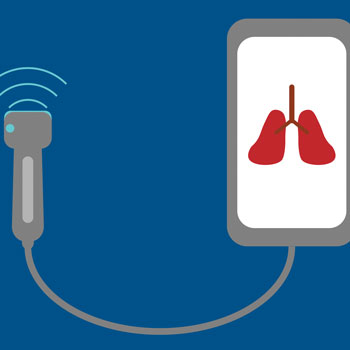Searching for gratitude by changing one's attitude
A columnist engages in an exercise in gratitude during difficult times.
I decided to conduct an exercise when writing this column and it was honestly much harder than I thought it would be. Given that this is my November/December article and that my October article was a bit dark for Halloween, I wanted to focus on gratitude for Thanksgiving. Yet, to be honest, I struggled with what there is to be thankful for this year, beyond the enduring presence and support of my loved ones. What, in fact, is there to be thankful for in 2025 from an ACP advocacy perspective?
I think first and foremost, I am grateful for my ACP staff colleagues, particularly the 23 of us who work in the Washington, D.C., office of the Division of Governmental Affairs and Public Policy. Within our division of ACP, there are four very hard-working departments. The Legislative Affairs Department, where all our congressional lobbying takes place, is headed by Director George Lyons and Manager Jared Frost. George is not only the department director, but is also the Executive Vice President of ACP Services, Inc., which is connected to ACP via a revenue-sharing agreement. ACP Services is a c6 entity, so it can conduct political advocacy and is where ACP's political action committee (PAC) is housed, whereas ACP is a c3 entity, or a non-profit with statutory limits on the volume of advocacy it can undertake. Every member of ACP is also a member of ACP Services, although not every member of ACP Services is eligible to donate to ACP's PAC. That is limited to registered voters in the United States. Legislative Affairs is also where our state/chapter advocacy is housed, as well as our Advocates for Internal Medicine (AIM) Network, which is where we conduct all our grassroots outreach.
The Regulatory Affairs Department within our division is led by Director Brian Outland and Manager Dejaih Johnson. This department leads ACP's advocacy with the federal agencies, including the Department of Health and Human Services (HHS), CMS, Veterans Affairs, Assistant Secretary for Technology Policy, Federal Trade Commission, and many others. These staff dig into the nitty-gritty aspects of physician coding and fee-for-service payment, health information technology standards, alternative payment models, and numerous other areas that are technical, challenging, and extremely important to the day-to-day lives of our members.
Our Health Policy Department underpins nearly all the work we do in advocacy. Led by Director Renee Butkus and Manager Ryan Crowley, this small but mighty department is responsible for working with our Health and Public Policy Committee to develop our policies on such issues as graduate medical education, immigration and physician visas, climate change, firearm violence, reproductive health care access, LGBTQ+ health, insurance coverage and cost of care, disparities, and so much more. Staff and ACP leadership cannot comment on any issue unless we have existing policy, and this department makes sure that we fill any policy gaps and regularly ensures our policy is updated.
Last, but definitely not least, is ACP's Center for Ethics and Professionalism, which recently joined the Division of Governmental Affairs and Health Policy and is led by Director Lois Snyder Sulmasy. While the Center is not directly engaged in advocacy, its work is critically important to our public policy development and to how we implement our advocacy efforts. It oversees and updates ACP's Ethics Manual and regularly develops ethics and professionalism policy to guide our members.
The leaders and staff of all of these departments help to keep me inspired and engaged, even when it seems like we are shouting into the abyss. I also want to acknowledge the critical importance of staff in several other divisions of the College. We work very closely with our Public Relations and Marketing teams to get the word out about all our efforts. The Medical Education Division regularly helps us with instructional design and other advice. The Technology Division is indispensable in terms of their support to my team on every level. The Membership Division keeps us up to speed on issues and data that we need to be aware of to better conduct our work. There are so many other staff to be thankful for, and I know I am missing many here, who make my job and the jobs of those in my division so much easier. Working for a mission-based organization like ACP is truly a blessing.
So, what else am I grateful for as we close out our advocacy in 2025? I am grateful that ACP, as well as several other medical societies, is developing reliable, evidence-based immunization guidance for influenza, COVID-19, and respiratory syncytial virus in the absence of a functional Advisory Committee on Immunization Practices (ACIP). To date, the American Academy of Pediatrics, the American College of Obstetricians and Gynecologists, and the American Academy of Family Physicians have released guidance for their patient populations, and ACP's guidance is coming soon. The College's Population Health and Medical Science Committee is in the process of developing clinical immunization recommendations, following our scientific and rigorous processes for developing evidence-based clinical guidelines. ACP is the only U.S. organization and physician specialty society in the world to be designated as a GRADE Center and Appraisal of Guidelines for Research and Evaluation (AGREE) Center and is also a founding member of the Cochrane US Network. Given the strength of our processes, physicians will be able to count on our final recommendations once released.
I am also grateful for the professional staff within HHS who are still working hard to protect public health and develop regulations that guide the federal payment systems for health care. For instance, while several CDC leaders recently resigned in protest, for very understandable and respectable reasons, over the actions of Secretary Robert F. Kennedy Jr. and other political appointees, there are still staff within HHS who are trying to maintain some of the department's credibility in the face of great challenges. Additionally, staff within CMS are working to finalize the major payment rules for 2026, including the Medicare Physician Fee Schedule, which should hopefully be released near the time of this article's publication (assuming the government has re-opened).
I'm deeply grateful for the ACP members who are out there providing high-quality care to patients across the country and internationally. Perhaps I'm biased, but in my opinion, internal medicine physicians are simply the best—highly trained in providing primary and comprehensive care, hospital care, and numerous types of subspecialty care. I get the privilege of traveling to several ACP chapter meetings a year, which affords me the opportunity to meet hundreds of members and get to know many of them well. They help keep me inspired even in the most difficult times.
Speaking of ACP chapters, they are also a source of my gratitude. Over the past year, several staff in ACP's D.C. office have had the opportunity to work with five of our chapters on advocacy pilot programs to prioritize their policy issues of focus, build out coalitions, implement local advocacy days, and more. We hope to take what we've learned from these pilots to better support all our chapters in their advocacy efforts. In the meantime, chapters can always reach out for support via our state health policy website and submit an advocacy assistance request form. As of the third quarter of 2025, we had received 150 total chapter and member requests from 38 states on numerous topics including but not limited to vaccines, Medicaid, the physician workforce, immigration, and telehealth.
Our members' grassroots efforts are also something I'm deeply thankful for. In the first three quarters of 2025, our advocates (i.e., members of the AIM Network) have taken 3,048 actions (one action equals a message sent to a representative and two senators), including 752 actions in the third quarter alone. These actions have been on important topics, such as Medicaid access, federal funding for key programs, Medicare payment, evidence-based vaccine access, the right to contraception, and more. These actions make a difference, as members of Congress need to hear directly from physicians on the ground about how their actions impact physicians and patients. We are now in the process of planning our advocacy and policy priorities for 2026 and look forward to engaging our members in these efforts next year.
Gratitude has been defined as a sense of happiness and thankfulness in response to a fortunate happenstance or tangible gift. Some researchers have found that gratitude helps people focus on the positive aspects of their life and can help them build and maintain relationships with others, leading to hope, life satisfaction, and more proactive behaviors toward others. These are all things we can use more of today, so as difficult as it might be, I call on all of you to engage in this exercise with me. What are you grateful for in 2025?





